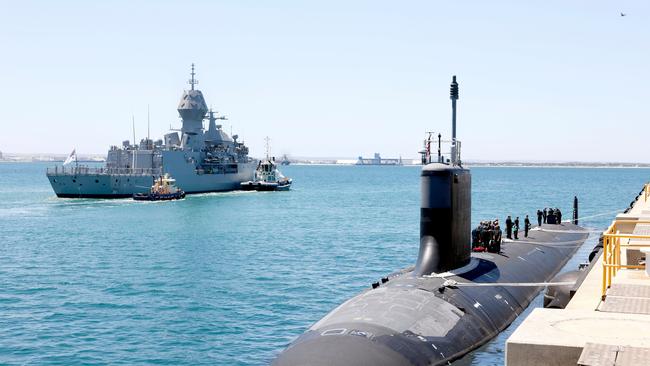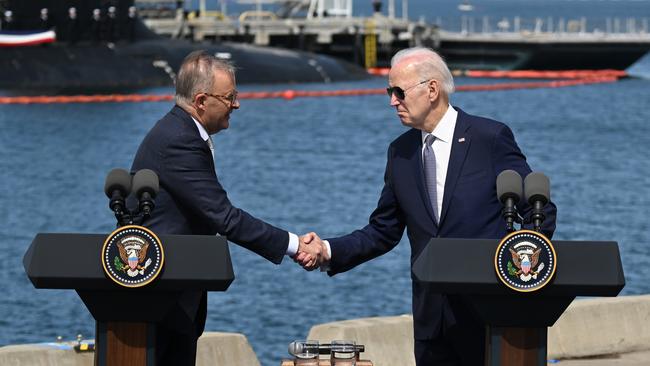
It’s good symbolism, of course. The congress on a bipartisan basis is endorsing, in principle, the decision to provide nuclear-powered submarines to Australia.
But the out clauses are prodigious.
First, Australia has to have paid $US3bn towards building up the US submarine industry. That’s entirely separate from the purchase price of the submarine itself.

Second, the US president at the time, and we’re talking probably three presidential administrations into the future, has to be able to reassure congress that providing the subs to Australia won’t “degrade US undersea capabilities”.
That’s likely to be a very big ask. The US is barely producing 1½ nuclear submarines a year. A Virginia takes seven years to build. The US is unable to ramp up production numbers rapidly. The Biden administration has not significantly increased defence spending nor ramped up in a big way US defence industrial capacity. Even urgent defence expenditure, such as military aid for Israel or Ukraine, cannot pass the congress at the moment.
And then the legislation also requires that the transfer of the sub be “consistent with US foreign policy and national security interests”. That’s a polite way of congress saying if you get our sub you have to be willing to fight over Taiwan, if it comes to that.
Peter Dutton was analytically correct when he used to say in government that it’s inconceivable that the US could be fighting for a Pacific democracy and Australia stand on the sidelines. If we did that, it would certainly mean the end of the US alliance for us forever, with all the disastrous consequences that implies.

But government ministers shouldn’t say that publicly. No Australian government can ever offer another nation the right in-principle to declare war on our behalf. This could well be a very big sticking point near to the time of any deal actually proceeding.
The US will certainly be short of nuclear-powered subs. The Chinese will have had a further decade of breakneck military development and build-up, including their own new, stealthy subs.
Washington providing Australia a nuclear sub means taking one out of their own order of battle. In the long run, perhaps some time in the dying years of the 21st century, Australia may one day be building nuclear subs in Adelaide, though it seems hellishly unlikely. If that day ever comes, Australia will be adding to the military production capability of the alliance. Until then, any nuclear sub America sells Australia reduces the US capability vis-a-vis China.
The US legislation specifically requires that the US be building enough subs of its own by then. It also requires that Australia actually be able to host and operate nuclear submarines. There is nothing in our performance so far at all which would give us confidence on that score.
The biggest problem with the AUKUS deal is that the Albanese government has done absolutely nothing to produce any significant new military strike capability or any deterrence outside the notional acquisition of nuclear subs beginning, in the unlikely event that everything goes to plan, in 10 years time.
In a recent piece summarising his government’s achievements, Anthony Albanese had the decency and common sense not to mention defence at all, because apart from symbolic diplomacy around AUKUS, absolutely nothing has happened at the Australian end.
For American strategic hard heads, what you do is always vastly more important than what you say. And right now we’re doing nothing at all.








The US legislation to notionally enable Australia to buy a Virginia-class nuclear-powered submarine in a decade’s time is a good first step, but like everything in AUKUS the payday is far, far beyond the horizon, there are countless “out clauses”, making the commitment at the moment purely symbolic.